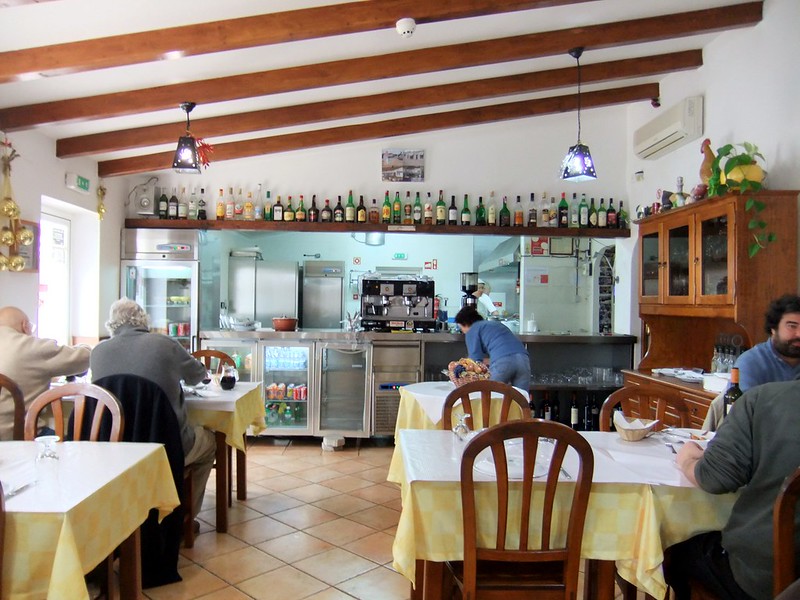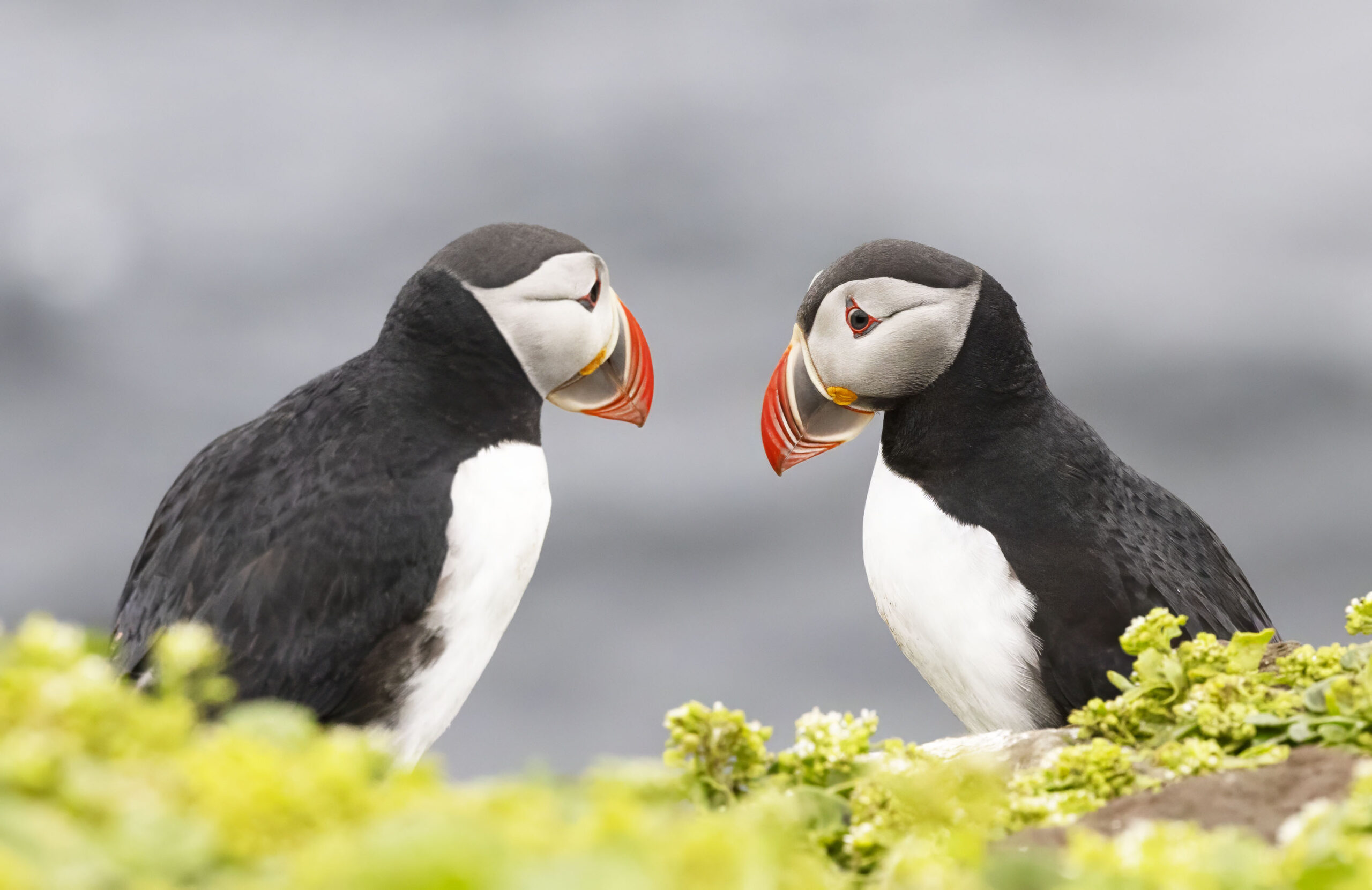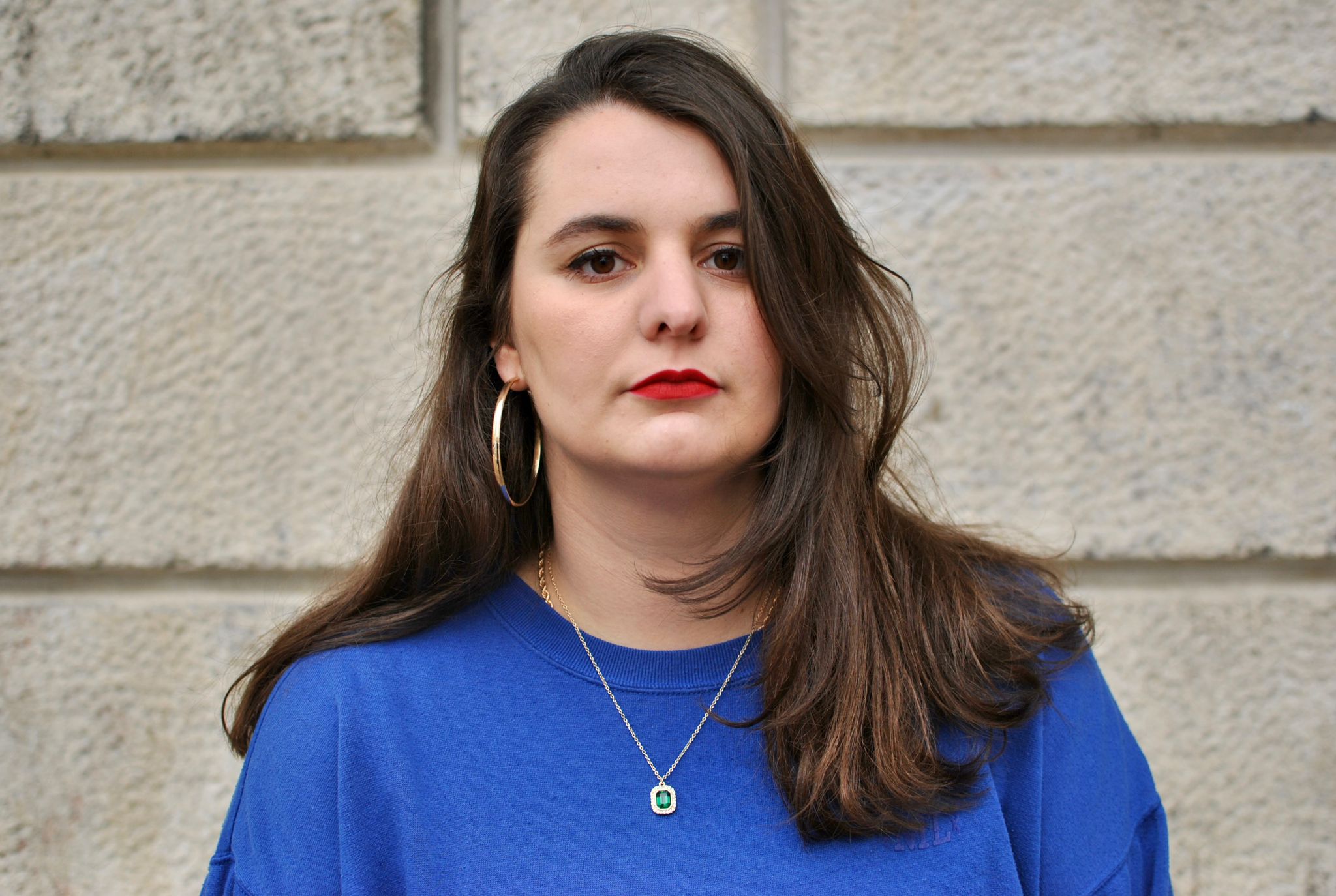
“It’s Borges, the other one, that things happen to,” wrote Borges. This is a statement that makes me think of my other self, the other Laughlin who lived in another world, another time, as another self in another country—as we’re always another when we live outside our native land.
It was the other Laughlin searching for the restaurant in Aveiro, Portugal that night, his glasses wet with drizzle, trying not to slip on the calçadas. The streets deserted, he stops at the address of the recommended tasca, but the sign says, “Beira Douro,” the name of the region. It’s only when I double back twice that I see the name, Adega Evaristo, and through fogged windows the shapes of diners inside.
The word on the door says puxe, pronounced poozshe, so my immediate impulse is to push, though I know this word means pull. I realize my mistake too late, am banging the door, and stepping inside to find every diner’s face trained on mine, this foreigner making a racket, glasses now fogged. On cue, they return their gazes to their dishes. I wipe my lenses.
The restaurant is long and thin with those small, Portuguese wooden tables draped with white paper. I stand awkwardly at the door wanting to lean on something, but there’s nothing to lean on. I’m relieved to see one empty table.
A man emerges through some curtains at the back, and without looking at me, approaches a wooden cupboard and extracts two small wine glasses. He isn’t wearing the usual uniform of the Portuguese waiter—white, button-down shirt, black pants, black apron—but a yellow shirt, oversized, I think, to hide his large belly. Just as he turns, he glances in my direction, and I read his annoyance at that Laughlin standing there with his foreign jacket, his foreign glasses frames, his American jeans, tote bag, his foreign hair, skin, face, and blood.
The man finally returns to the cupboard, removes a plate, looks at me, raises a chin: “Diga,” he says: Speak. I address him in Portuguese, the words pronounced well enough but not good enough. He jerks his thumb to a doorway to my left and mumbles something, and when I don’t move, his tongue slathers words into the air again, the thumb jerking, and I see there’s another curtain and understand I should go there.
I step into a room with a bar on the right, a line of three tables along the wall to the left, all unoccupied, and a kitchen beyond. Four men are sitting at the bar, and they immediately stop talking and stare. They wear thick coats and hats, have bleary eyes, skin of men who work in the elements, probably fishermen. Again, as if on cue, they return their gazes to what I now see are bowls of soup.
A man about sixty behind the bar waits silently, and when I say what I said to the first man, gratitude is written across his face. The older generation doesn’t speak English like the younger one, so he’s likely relieved he doesn’t have to point and repeat, that charade we engage in when we don’t share the same language. He leads me to a table, slaps down the menu, and walks away.
You might think I find this churlish attitude unwelcome, like other Americans who, when they encounter it, flock to Yelp and TripAdvisor to bemoan how rude the service was. They don’t know this behavior isn’t about you but is born of deep cultural roots. Portugal sits at the far southwestern corner of Europe with a traditional enemy, Spain, at its back, thus cutting it off from the rest of Europe. Portugal is not a Mediterranean country but Atlantic, the ocean that borders the entirety of its coast, and to which Portugal shows its face. This unique geographical situation is why those sailors went out into the ocean to “discover” the world: all possibility lay in the unknown rather than behind its back in Europe. Ultimately, Portugal is an island nation and has the islander’s suspicion of outsiders.
The Fascist dictator Salazar’s isolationist policies in the 20th Century also contributed. For example, Coca-Cola was only allowed into Portugal in 1977 after Salazar died—though the poet Fernando Pessoa had written an advertising jingle for the drink before Salazar came to power: Premeiro estranha-se, depois entranha-se (“At first it feels strange, and then it enters you”).
I welcome this attitude because it shows they don’t care about me or my tourist dollars. The massive influx of foreign dollars that floated the Portuguese economy but threatened local ways of life in Lisbon and many other areas of country, at least until the pandemic abruptly halted travel. But this is 2019. I am grateful to be here, tucked away. I take the menu and try to read, through the plastic, an unreadable Portuguese scrawl listing the dishes.
The man returns with bread, olives, and a small plate for the olive pits, which he places next to the salt and pepper shakers. I order caldo verde (kale soup) and fatias de vitela (sliced veal) and a half bottle of Castello d’Alba, for you always order drink with your food in a tasca, not before, as you do in restaurants in the United States.
The men at the bar, the four of them, glance at me out of the corners of their eyes and whisper, as if they’re talking about me. Though they’re bearded, their complexions are whiter than the Portuguese with whom I usually consort, many from Lisbon and further south. I’ve heard people from the north call southerners “those Moors,” a sly jest that reveals anxiety about the Moroccans who once occupied Portugal as far north as Porto.
The caldo verde mixing with the dark red wine spreads a low flame of warmth inside me, just what this food and wine is made for. Then the main course arrives, meat in the middle with a pile of rice on one side and French fries on the other, this portion of carbs the surest sign that this tasca should be respected. I begin to eat as the television hums low above the far corner of the bar and runs a story speculating on how good the cherry crop will be.
The door opens—I see this side of the restaurant also has a door—and a bald man with a dangling earring in his left ear and wearing a black hoodie and bright white tennis shoes greets the other men and sits at the corner of the bar. He gives me a hard stare, his look so challenging I wonder if he wants to fight me. A can of Coke is placed before him, which he grabs, looks hard at me again, then disappears into the next room. I now think this look wasn’t a challenge but a flirtation.
The door opens again, and a woman dressed in an evening gown steps in and asks the bartender a question; satisfied, she yells out into the street, and three more women enter. They’re all fashionably dressed, hair styled, and wearing stiletto heels upon which they drunkenly sway. One, in a pink faux fur coat, is holding a bouquet of flowers, which she throws on the bar. They order drinks, and the bartender begins working the espresso machine, and the men at the bar at once seem confused but also familiar with them.
I wonder, if I were from here, or lived here, if I’d understand implicitly where they’d been, where they were going, why they’ve stopped here, why one has flowers, what kind of people they are—these hidden meanings of culture I don’t have access to, unable to discern the deeper layers, condemned, like all travelers, even experienced ones, only to see the surface.
The one in pink is now leaning on the bar as if she’s about to pass out, and when their bicas, or small shots of espressos, are placed on the bar, her friend nudges her, and they all drink them like shots, pay with some coins, wave, and stumble out the door. The men look at each other and chuckle, and I realize it’s the first time I’ve seen anyone smile all day.
That other Laughlin returns to his plate, a foreigner in the corner, while this Laughlin wonders where those people are. What are they doing at this moment? For now, we remain in that bar, our other selves, islanders, together on the page.
Scott Laughlin’s fiction and non-fiction has appeared in Guernica, Great Jones Street, Post Road, The L.A. Review of Books, and other publications. Scott has an MFA from Converse College and is Associate Director of the DISQUIET Literary Program in Lisbon, Portugal. He currently teaches at San Francisco University High School.




